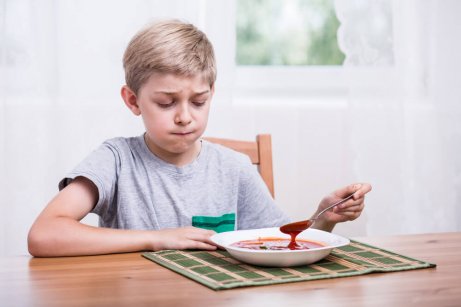What to Do If Your Children Won't Eat

Trying to figure out why our children won’t eat can be very difficult. They may be ill, they might not like the food, or it could be an attitude issue.
Almost all parents have gone through stages when their children are reluctant about food. It’s a scenario that produces a great amount of worry and frustration.
However, a lack of appetite can be the result of many motives, and most of them aren’t related to negative causes.
That’s why we want to talk to you today about the various aspects you should consider if your children won’t eat. Of course, we’ll also provide a few possible solutions.
What to do when children won’t eat
Find the reason behind the “no”
The first aspect that you should consider is why your child refuses to eat. There are a number of reasons this may occur. Many of them have to do with your little one’s age:
- Children between the ages of 1 and 5. According to nutrition specialists, at age 1, children develop a decreased ability to ingest foods in comparison to the previous months. You may come to think that your child doesn’t want to eat. But the fact of the matter is, small children fill up easily and still meet the needs of their bodies.
- Between 6 and 8 years of age. During this age range, children start to ingest more foods. This fact coincides with a period of increased physical growth as well.
- Psychological causes. Children who are very spoiled may refuse to sit at the table. What also may happen is that preschool aged children eat snacks and sweets while they’re at school. As a result, when the time comes to eat a big meal, they already feel full and therefore refuse to eat.
- Particular illnesses: In specific cases, children may refuse to eat during their first year of life due to illness. Issues linked to the functioning of a child’s kidneys, lungs or gastrointestinal tract can all be to blame. It’s always a good idea to talk to a doctor if you have any doubts or your child refuses to eat altogether

What to do when children won’t eat: Solving the problem
Once you’re aware of the possible causes, you should focus on how to get your child to want to eat. As always, it’s important to distinguish between a child who isn’t hungry and a child who just doesn’t want what’s being offered.
Remember that you also need to avoid overfeeding your child. Even if it seems like your child is eating small portions, your child may actually be full. In that case, his or her stomach won’t be able to take in any more food.
“According to nutrition specialists, at age 1, children develop a decreased ability to ingest foods in comparison to the previous months”
Useful tips
Below we’ll provide you with a list of simple and practical ideas to keep in mind when children won’t eat:
- Offer food portions that are right for your child’s age on the biggest plate you have in the house. This creates the visual effect that you’re serving less than you really are. Kids think they’re only getting a small amount of food, and will gobble it up.
- Don’t let your children drink juice or water before finishing the main meal or food item. If you do, they’ll fill up fast and won’t have enough stomach space to eat well.
- Turn off the TV and ask your children to put their toys away 20 minutes before mealtime. That way, they won’t have distractions and will be able to focus on eating. While your children tidy up, their appetite will increase.
- Never use mealtime as a moment to argue. Don’t discuss problems at school or scold your children about how messy their rooms are. This will only cause them to associate food with judgement and criticism.

- Don’t give into your child’s every whim and demand: Your child may very well refuse to eat anywhere but the bed or in front of the TV. At the same time, children are often prone to want only junk food and sweets rather than a balanced meal. In those situations, it’s important not to give in. Stay firm and give your child some space. Wait for him or her to get hungry enough to sit at the table and eat the meal you’ve prepared.
- Avoid giving excessive amounts of foods that are high in sugar, fast food, and fried foods. It’s a proven fact that children who eat too many sweets or foods with flavor enhancers like MSG will be less willing to eat healthy and homemade foods. Remember that fast foods tend to contain a high content of flavor enhancers.
As a final recommendation, never punish your child at mealtime. Nor should you leave your child sitting at the table all day until he or she finally eats. Consider portion size as well.
If you follow these tips, you’ll soon see your children eating more of the legumes, vegetables and proteins that their bodies need.
All cited sources were thoroughly reviewed by our team to ensure their quality, reliability, currency, and validity. The bibliography of this article was considered reliable and of academic or scientific accuracy.
- Martínez, E. (2020, enero 28). Niños con poco apetito: ¿cómo ayudarlos? Recuperado mayo de 2020, de https://mejorconsalud.as.com/ninos-con-poco-apetito-ayudarlos/
- Carabaño, T. (2019a, enero 8). Qué hacer cuando los niños no quieren comer. Recuperado mayo de 2020, de https://mejorconsalud.as.com/que-hacer-ninos-no-quieren-comer/
This text is provided for informational purposes only and does not replace consultation with a professional. If in doubt, consult your specialist.








